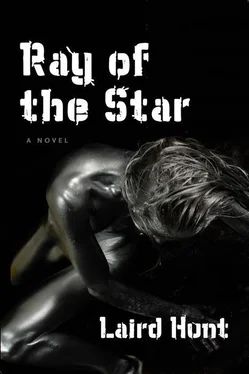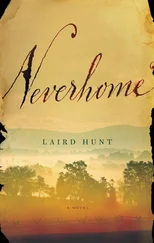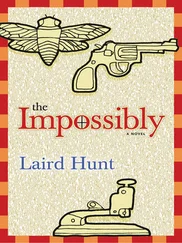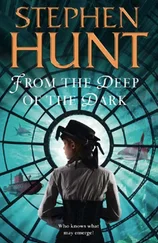“You tell us,”
“I see,” said Doña Eulalia, still looking at the box, which was now sitting next to her teapot, its cargo of what looked like chocolate ducklings on clear display through its plastic top,
“It’s going to get colder tonight,”
“A turn in the weather,”
“Drink tea and eat chocolate, it will keep you toasty,”
“That’s what they do in the Amazon,”
“Something like that,”
“When they get a fever,”
“Or take fright,”
“Being as it never really gets cold there,”
“Anyway, we won’t keep you,”
“We just stopped by to deliver the token,”
“The mark of our gratitude,”
“Have one,”
“I should have warned them, poor dears,”
“Oh, you’ve warned them,”
“You’ve been marvelous,”
“Now you deserve a rest, a good sleep,”
“Have a chocolate, they’re excellent,”
“I don’t think so,” said Doña Eulalia,
“But we do,” said one of the old men,
“Yes, we certainly do,” said one of the others,
“We certainly fucking do.”

In the places
only the dead dream, I will look for our reflections.
That night something like a wind left over from deepest winter made its way through the city, banging shutters, frosting balconies, flattening exposed strips of grass, crisping flowers, scattering wadded paper and ice cream wrappers and freshly discarded metal cans, and making the people who were still out, everywhere — their eyes scanning the heavily mitigated darkness for directional cues that would simultaneously lead them further into adventure and help them avoid disaster — wrap goose-pimpled arms around themselves and reach for coats they weren’t even sure they could have found if they were at home, and while it would be maudlin to propose a direct connection between that wind — which among many other things simultaneously rekindled then extinguished the end of the perambulating Raimon’s real cigar and froze the tips and knuckles of his strange hands, smashed the hat off the balding and unusually delicate head of Almundo, of Almundo’s Store for Living Statues, as he closed up for the night, and elicited an extraordinarily general and multilingual polyphony of “What the Fucks”—and Doña Eulalia’s message, it would be needlessly artificial not to pause for a moment in the insistent face of it and let it stretch its serpentine fingers through the groaning city, through its parks and plazas, its courtyards and late-night kiosks, before returning to Harry — an earlier incarnation thereof — reading the paper a lifetime ago on a stone terrace that looked out over an immense caldera whose rippling waters sparked and glittered in an afternoon light so ferocious it seemed to him, as he told Solange long after they had left Doña Eulalia’s, when his voice had finally returned, an exact inverse of the icy howling that had kept them up half the night under inadequate covers, one that would sear his flesh, char his bones, and leave nothing behind but a few black crumbs for the young waiter to sweep up, which was really neither here nor there, because, he said, what he had thought of in particular when Doña Eulalia had made her pronouncement then, politely but firmly, told them to leave without asking any questions because they would not, because they could not, be answered, was not of the temperature, but rather of the palm reader, festooned with purple and turquoise scarves, as well as some kind of Kung Fu jacket, who had been working her way from table to table across the terrace until, inevitably, she had appeared before him and none-too-politely demanded his hand, which he had surprised himself by removing from the top left corner of the paper and offering to her, though without quite looking away from the article he was perusing as he did this — which, he told Solange, had been meant to indicate a measure of disinterest in or even disdain for the proceedings — but before his disdain had had a chance to fully unfurl, the palm reader had given out a shriek, flung his hand away, and moved off so quickly that she was gone before he could take his eyes off the paper, and because his eyes were more or less there anyway, and the thought of someone looking at his hand and shrieking was unsettling, he had continued to pretend to read, until, after not too terribly long, he had been able to actually continue reading and enjoying the view of the caldera, if not the infernal heat, and then his time alone had ended and the others had joined him, and while in the ensuing avalanche of activity he had stopped thinking about the palm reader and her reaction to his palm, that night he had seen her billowing scarves and Kung Fu jacket and heard her shriek over and over again and then, less than a year later, well …
Y es, well, Harry thought, trying, without much luck, to swallow and realizing that he had been sleeping, that he had finally dreamed his way out of the misery of the cold, and that, of course, Solange was no longer there, that he would not see her, if at all — and given his behavior the if was not inconsiderable — until later in the day, that for the past few minutes he had been telling his sad little story to himself, a recitation he had punctuated by smacking the silver bell, then grabbing it and without quite knowing why shoving it into his pocket, and that, to carry matters to a head, as one might say, there was now a knocking at his door, like a reification of Doña Eulalia’s portentous words, and for several seconds he lay under his covers without moving, until it suddenly seemed imperative that he move, and quickly, before whoever it was stopped knocking and went away, just in case it was, well, them, so he leapt up, ran his fingers through his disastrous hair and, still trying to swallow, his heart smashing itself against his ribs, ripped opened the door, though not onto any unspecified “They,” but rather onto a clearly distraught Señora Rubinski, who told him he must come down to her apartment immediately because her husband, Señor Rubinski, was not well,
“Not well,” Harry repeated, trying and failing to catch his breath,
“He won’t come out of his bath,” Señora Rubinski said and, taking Harry by the wrist, led him downstairs, through her front door, over the recently polished wide-plank floorboards of a long hallway, through a living room glowing in the morning light coming in through gauzy drapes, and down another, longer hallway to a door covered in chipped blue paint that stood slightly ajar,
“In there,” Señora Rubinski said,
“But it’s not locked,” Harry said,
“I never said it was locked,”
“I assumed …”
“I don’t follow you,”
“But you haven’t gone in?”
“Into my husband’s bath, without his permission …” Señora Rubinski gave out a snort of indignation and Harry, rather hopeful that the wind was still howling and he was still dreaming, nodded gravely to show that he understood and endorsed the local protocol, knocked lightly on the door, said, “Excuse me, Señor Rubinski, it’s me, Harry Tichborne, your neighbor,” then stepped in.
There was so much steam and so little light in the Rubinski’s bathroom that it took Harry, who initially had a hard time pulling his eyes up off the black and white tiles covering the floor, a good while to get his bearings, and a good while longer to register that the source of all the steam, an enormous, claw-footed white bathtub, which sat a luxurious distance from the door, was to all appearances empty, but given the circumstances, i.e. the presumed condition of its presumed inhabitant, he thought it prudent to wait until he could be absolutely sure before making his report to Señora Rubinski, so that when this latter called in to ask if everything was all right, Harry said that it was as far as he could tell, an absurd response that nevertheless seemed to satisfy the Señora, who said nothing further as Harry crept over and, nervously fingering the bell in his pocket, peered into the bathtub and, through the steam and gray residue of what might have been bubbles, its considerable depths, then, after checking in the room’s closet, where he found only a moth-chewed raincoat, made out of the most extraordinary purple cloth, which made him think again of the palm reader and look rather mournfully down at his hand, he went and sat on a sturdy wooden box placed between the sink and the tub, whispered, “I’m just going to sit here for a few minutes in case you are here and I can be of any service, Señor Rubinski,” and while there was no answer, at least none that Harry recognized, he continued to sit there and, in the voluptuous warmth enveloping him, so pleasant after the long, cold night that had left him so tired and more than a little out of sorts, even let his eyes shut and his mind wander to the past, by the palm reader and the newspaper to the caldera, which dwarfed the great ocean liners that entered it and seemed never to stop glittering, even at night, when clouds covered the moon and stars and he and his family huddled together in the big bed, and his darlings demanded stories about the gods who had stolen children and the mortals who had longed for their return, which now, as he sat in the Rubinski’s bathroom with his eyes shut, seemed to have everything in the world to do with the way his heart had started smashing at the knock on his door, not to mention the totally inadequate farewell which had been all he had been capable of offering Solange when — after he had told her he really had no idea who the “They” in question might be, not once but, after she had very gently, very delicately, asked him again, twice — she had left him, saddened and perhaps even angry he thought, to return to her own apartment, ostensibly to make sure her windows were shut, but more likely because of the lie he had so shamelessly let out into the room, a nasty little cloud of razors and butterflies that had swirled between them for the rest of the time she had stayed, both of them well aware, Harry was sure, that unlike the small one Solange had told as they lay next to each other in the Yellow Submarine this was a significant lie, one that if not confessed to could end up shredding whatever it was that was occurring between them, but rather than make what would have been a straightforward, expedient correction, Harry had simply watched it swirl around the room and, even when Solange had offered him an opening, a “perhaps you’d rather not talk about it, I completely understand,” had said nothing and eventually Solange had left, and he had gone on watching it and sticking his hand into it whenever it passed, and sometime during the night it had tired of moving around the room and had leapt back into his throat, and when it did so Harry realized that by making no effort at all to chase it out of the room while Solange had still been there he had done something very foolish, potentially damaging, and to what purpose? he had wondered, before going into the long story, the story he had both dreamed and told himself, about the palm reader, before Señora Rubinski had started pounding on the door, and Harry, his heart smashing against his ribs, had ripped it open, very much hoping that They had arrived, had come back, had returned, had accomplished what he had spent years hoping they would, just like Señor Rubinski, exactly like Señor Rubinski who had returned to make himself available for morning and evening walks, or like the calming hand placed on the shoulder of the crazed boat builder who wanted to plunge his lost love into Lucite, but They hadn’t, and outside of his hopes he couldn’t even be sure who or what “They” referred to, or even if Doña Eulalia was anything other than a crank of the first order with her lemon cookies and lamps, but the fact remained that there was only one “They” worth mentioning, insofar as he was concerned, and what would it have hurt him to say it, what could it have hurt to tell Solange, what could anything, he thought, now hurt and yet here he was, hurting, waiting for the warm steam to convert itself into the cold, dark water that the presence of Solange, whom he had chased away with his lies, had been keeping at bay, and when he pressed his hands against his lips and opened his eyes, Señor Rubinski, his stringy hair plastered to the top of his dripping, greenish head, was smiling over the edge of the tub at him, “I died in an industrial accident, fell into the paper mill where I worked, was torn to pieces,” he said.
Читать дальше













